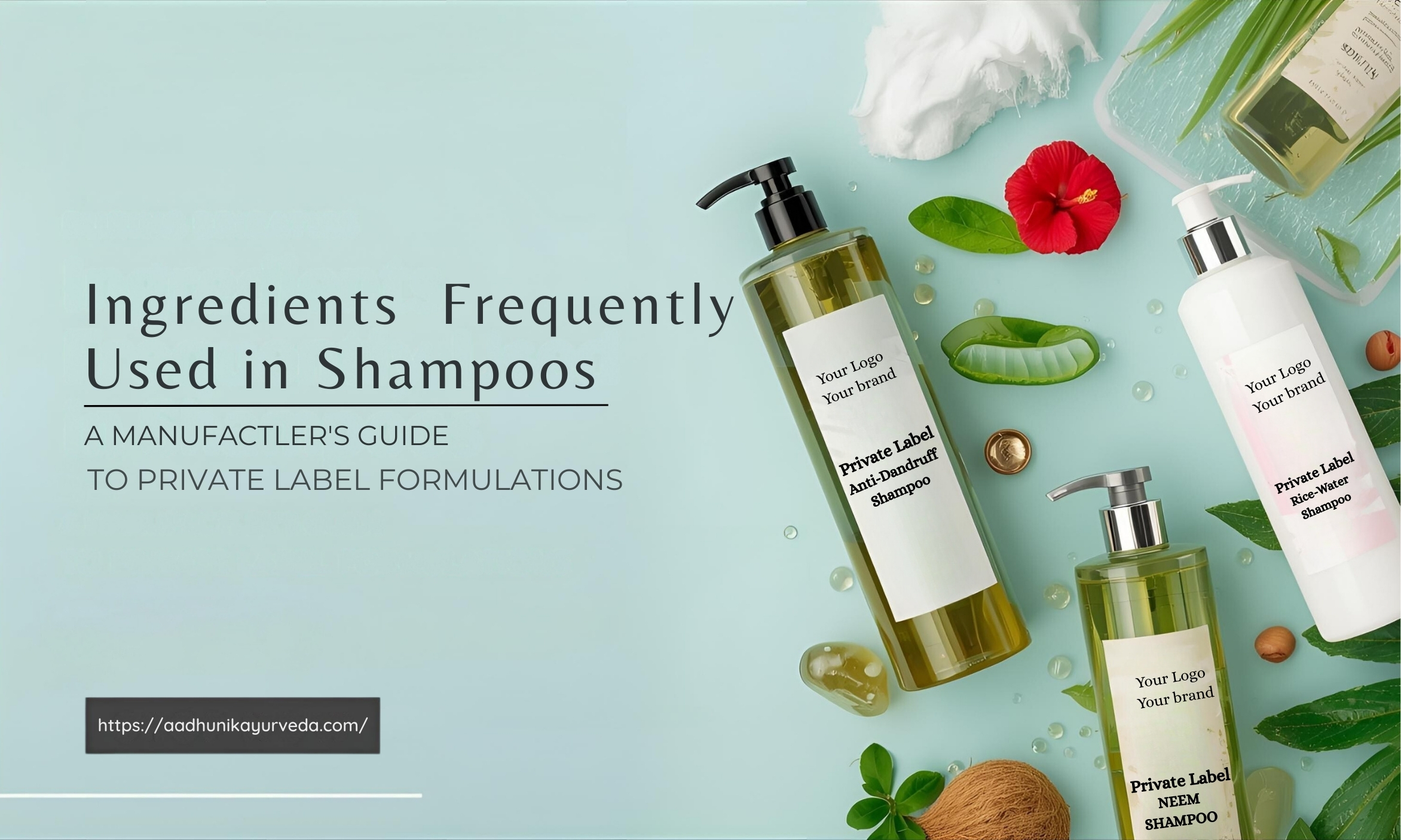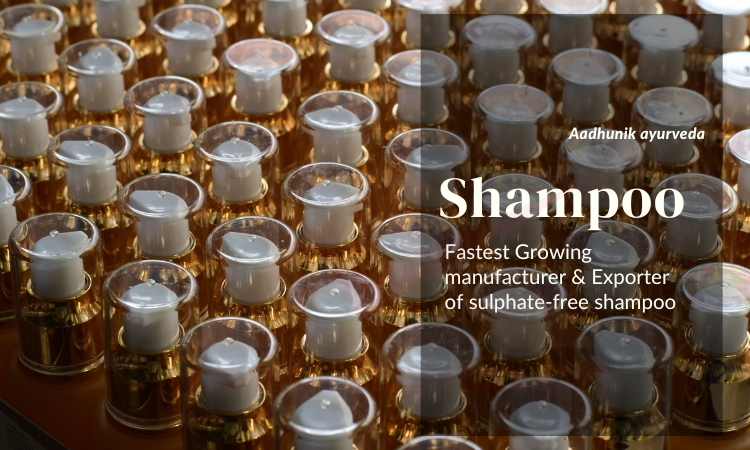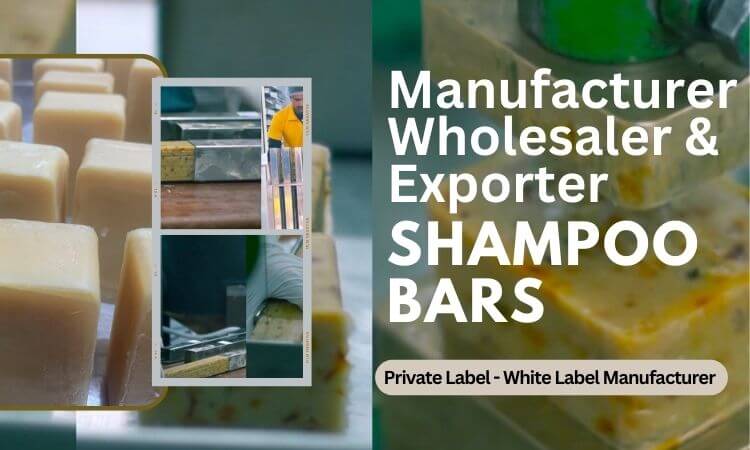
Ingredients Frequently Used in Shampoos: A Manufacturer’s Guide to Private Label Formulations
Why Private Label Brands Should Focus on Eye Care Products | Core Ingredients in Eye Treatment Products | Plant-Based Hyaluronic Acid (Cassia Angustifolia Seed Polysaccharide) | Vitamin C (Sodium Ascorbyl Phosphate) | Organic Licorice Root Extract (Glycyrrhiza Glabra) | | ConclusionWhen it comes to creating a shampoo that truly resonates with consumers, the foundation lies in selecting the right ingredients. Every successful shampoo formulation is built on the balance between cleansing efficiency, nourishment, scalp care, and consumer safety. As private label shampoo manufacturers, we understand that ingredient selection is not just about choosing what sounds appealing on the label, it’s about science-backed performance, long-term benefits, and compliance with international safety standards.
Today’s consumers are more aware than ever, scanning ingredient labels, avoiding harmful chemicals, and actively seeking formulations enriched with natural actives like plant extracts, essential oils, and proteins. This has shifted the focus of shampoo manufacturing toward clean, plant-based, and effective formulations that not only cleanse but also repair, protect, and restore hair health. For brands looking to launch their own shampoo line, understanding the ingredient landscape becomes essential, and that’s exactly what we’ll decode here from a manufacturer’s perspective.
Understanding Shampoo Formulation
Shampoo is no longer a simple cleansing product, it’s a multi-functional formulation designed to address diverse hair concerns. From oily scalp to dry, frizzy strands, every formulation must achieve synergy between cleansing, conditioning, and targeted actives.
As manufacturers, we don’t simply pick one or two ingredients; instead, we carefully curate synergistic blends where every ingredient complements the other. For example, while surfactants ensure proper cleansing, botanical extracts deliver nourishment, proteins improve structure, and oils provide softness and hydration.
Key considerations in formulation:
- Scalp & Hair Balance – A shampoo must cleanse without stripping away natural oils, ensuring scalp microbiome health.
- Texture & Stability – Consumers expect a rich lather, smooth feel, and stable product that doesn’t separate or degrade.
- Performance Across Hair Types – A formulation should cater to different hair types (curly, straight, colored, treated, etc.).
For private label brands, this means that every formulation is customized according to their target audience. Whether the brand aims to position itself as a luxury botanical line or a dermatologist-approved clinical care range, the ingredient selection process becomes the differentiator.
Key Factors in Ingredient Selection for Private Label Shampoos
Choosing ingredients for shampoo formulation is not only about functionality but also about meeting market expectations and compliance standards.
a) Market Demand & Consumer Trends
- Consumers want natural, sustainable, and transparent formulations.
- Popular trends include sulfate-free shampoos, silicone-free conditioners, and botanical-enriched formulas.
- Functional actives like plant proteins, vitamins, and herbal waters are now in high demand.
b) Functionality & Performance
- Cleansing agents (surfactants) form the base but must be mild and eco-friendly.
- Moisturizers and oils are integrated for hydration and softness.
- Proteins and plant extracts strengthen hair and improve manageability.
c) Safety & Compliance Standards
As a manufacturer, we strictly follow safety frameworks like:
- MOCRA (Modernization of Cosmetics Regulation Act, USA) for transparency and safety.
- FDA guidelines for ingredient approval and labeling.
- Organic and Natural Certifications (NPOP, NOP, USDA Organic, COSMOS, ECOCERT).
For brands, this ensures that their products are not only market-ready but also globally compliant, reducing regulatory risks.
Balancing Natural & Functional Ingredients in Shampoos
One of the biggest challenges for manufacturers is striking the right balance between natural ingredients and functional performance agents. Consumers are drawn to labels highlighting “with rosemary water” or “infused with olive oil,” but behind the scenes, the formulation requires technical ingredients that maintain pH balance, shelf stability, and consistency.
For instance:
- Natural actives like nettle leaf extract or rosemary water promote scalp health, but they work best when combined with stabilizers and mild surfactants.
- Proteins and vitamins deliver visible results but need correct concentrations to be effective.
- Moisturizing oils add richness but must be emulsified properly to avoid greasiness.
This balance is what differentiates a professional-grade shampoo from a DIY formulation. Brands partnering with manufacturers benefit from this expertise, ensuring the final product is both consumer-appealing and performance-driven.
Trending and Effective Ingredients Used in Shampoos
1. Equisetum Arvense (Organic Horsetail) Extract
- Benefits: Rich in silica, strengthens hair strands, reduces breakage, and improves scalp circulation.
- Why Brands Choose It: Enhances hair thickness and shine naturally, catering to clean beauty demand.
- Manufacturer Insight: We source horsetail extract through eco-friendly extraction methods, ensuring maximum nutrient retention.
2. Urtica Dioica (Organic Nettle) Leaf Extract
- Benefits: Controls dandruff, balances scalp oil, and promotes hair growth.
- Why Brands Choose It: Provides a herbal solution for itchy and flaky scalp issues.
- Manufacturer Insight: Our nettle extract is made using gentle water-based extraction, ensuring purity without harsh solvents.
3. Camellia Oleifera (Organic Camellia) Leaf Extract
- Benefits: A natural antioxidant, protects hair from UV and pollution damage.
- Why Brands Choose It: Appeals to consumers looking for anti-aging haircare solutions.
- Manufacturer Insight: Our camellia extract is obtained from organic farms, maintaining high polyphenol content.
5. Olea Europaea (Organic Olive) Oil
- Benefits: Deeply nourishes, softens, and prevents split ends.
- Why Brands Choose It: Long-trusted natural oil for dry, frizzy, or damaged hair types.
- Manufacturer Insight: We use cold-pressed olive oil to preserve essential fatty acids and vitamins.
6. Cannabis Sativa (Organic Hemp) Seed Oil
- Benefits: Rich in omega-3 and omega-6, strengthens follicles and prevents breakage.
- Why Brands Choose It: Growing trend ingredient in clean, vegan, and holistic haircare.
- Manufacturer Insight: We ensure hemp oil is cold-pressed and THC-free for safe cosmetic use.
7. Hydrolyzed Rice Protein
- Benefits: Adds volume, improves hair strength, and enhances shine.
- Why Brands Choose It: A natural alternative to synthetic conditioning agents.
- Manufacturer Insight: We use enzymatic hydrolysis to extract rice protein, ensuring bioavailability for scalp and hair.
8. Vegetable Glycerin
- Benefits: Acts as a natural humectant, locks moisture in hair and scalp.
- Why Brands Choose It: Clean-label ingredient with multipurpose hydration benefits.
- Manufacturer Insight: We use plant-derived glycerin sourced from sustainable oils like soybean and coconut.
9. Organic Lavender Water
- Benefits: Calms scalp irritation, adds a refreshing fragrance, and promotes relaxation.
- Why Brands Choose It: Combines both functional benefits and sensory appeal.
- Manufacturer Insight: Our lavender water is steam-distilled without alcohol, maintaining therapeutic properties.
10. Organic Rosemary Water
- Benefits: Stimulates blood circulation, supports hair regrowth, and reduces dandruff.
- Why Brands Choose It: One of the most trending ingredients in natural haircare in 2025.
- Manufacturer Insight: We use fresh rosemary leaves in hydrosol form to maintain maximum aroma and potency.
Why Brands Choose Us as Their Private Label Shampoo Manufacturer
- Expertise in Clean Formulations – Specialized in sulfate-free, paraben-free, silicone-free shampoos.
- Customization for Target Market – From anti-dandruff to luxury botanical lines, we tailor ingredients as per brand goals.
- Sustainable Practices – Eco-friendly sourcing, cruelty-free testing, and green chemistry methods.
- End-to-End Support – From ingredient selection to packaging and certifications, we support brands through the entire launch process.
Future of Shampoo Ingredients
The shampoo industry is evolving rapidly, with innovation centered on scalp health, sustainability, and biotechnology. Future trends include:
- Plant-Based Proteins – Alternatives to keratin and collagen for vegan brands.
- Fermented Botanicals – Higher bioavailability and better absorption.
- Scalp Microbiome-Friendly Actives – Ingredients that balance healthy scalp bacteria.
- Upcycled Ingredients – Using food industry by-products (like fruit peels) for sustainable actives.
These innovations will define the next generation of shampoos, and as manufacturers, we are already integrating these trends into R&D pipelines.
Conclusion
The success of any private label shampoo lies in ingredient transparency, safety, and performance. As manufacturers, our role is to guide brands in choosing the right mix of cleansing agents, botanical extracts, proteins, oils, and moisturizers that align with their market vision. With the right formulation strategy, brands can stand out in a competitive market while delivering shampoos that consumers trust and love.
FAQs:
What makes natural ingredients better in shampoos?
Natural ingredients are gentler, eco-friendly, and provide long-term scalp and hair benefits compared to harsh chemical actives.
Can I customize shampoo ingredients for my private label brand?
Yes, as manufacturers, we offer custom formulations tailored to your brand’s goals — from growth-focused to anti-dandruff or premium botanical lines.
How do manufacturers ensure ingredient quality and consistency?
Through certified suppliers, in-house testing, and GMP-standard production, we ensure consistent quality and safety in every batch.
What certifications are important for shampoo ingredients?
Important certifications include MOCRA compliance, Organic certifications, Good Manufacturing Practices, carbon neutral, cruelty-free, depending on market entry goals.
What’s trending in shampoo ingredients right now?
Plant-based proteins, herbal waters (like rosemary, hibiscus, fenugreek, rice & lavender), and scalp microbiome-focused actives are the most in-demand ingredients today.


